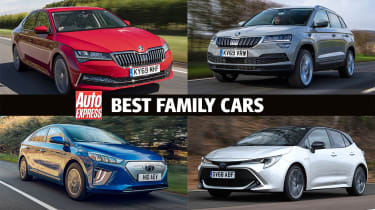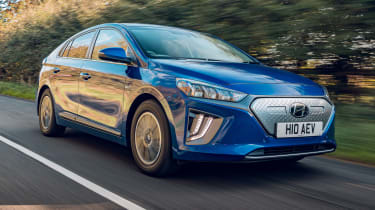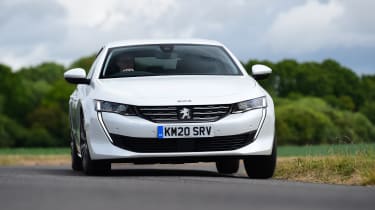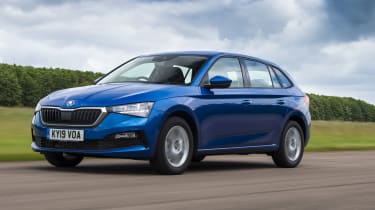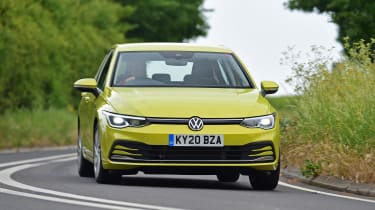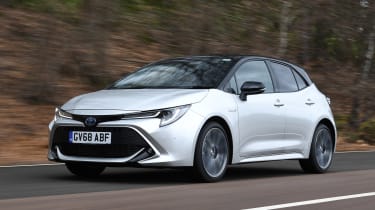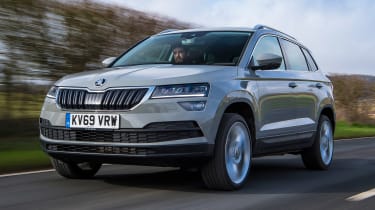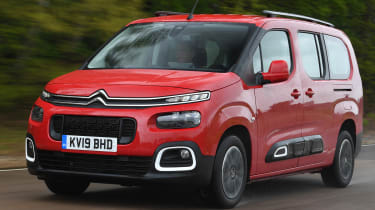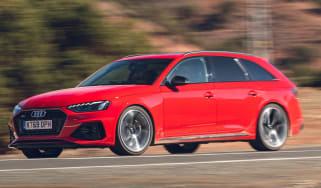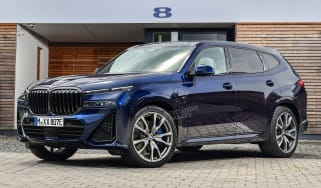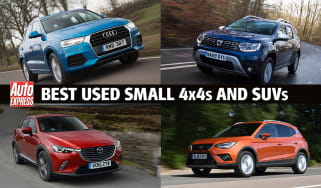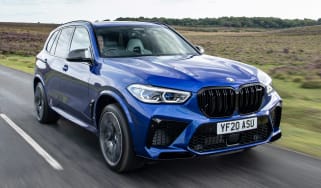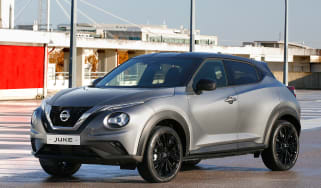Best family cars to buy 2021
What are the best family cars on sale? Whether you're after an SUV or an affordable hatchback, out top 10 list reveals all...
Building the best family car can be more challenging than you might think, given that motorists with children (and the kids themselves) tend to ask a huge amount of these vehicles. That isn’t to say car makers are throwing in the towel; if anything, the choice facing buyers on the hunt for a family car is greater than ever before.
We’ve analysed the market as it appears to family car buyers. Looking at hatchbacks, SUVs, MPVs, saloons and estates we’ve come up with a definitive list of the best family cars on sale right now.
Family hatchbacks offer great fuel economy and plenty of space in a compact package. The best examples are great all-rounders with a good mix of qualities but many buyers will need the extra space of a large family car or estate. Here, as a rule, you get more rear legroom, a bigger boot and superior long-distance comfort, but you’ll pay a bit more and fuel economy might take a hit.
For the ultimate in flexible interior space, you’ll want an MPV of 5 or 7-seat capacity, but the modern trend in family cars is very much towards SUV and crossover models. With these you get the higher driving position and easier access that comes from the elevated ride height plus light off-road capabilities, should you need them.
Our list includes something for everyone, with MPVs like the Citroen Berlingo, and large family cars like the Skoda Superb and Peugeot 508 that also come in estate guises.
Like MPVs, traditional large family models are sliding in terms of popularity but don't let that put you off, as these conventional family cars offer great driving dynamics and many are available with hybrid power for great economy and lower road tax.
On this list the new Volkswagen Golf hatchback has been joined by the latest Vauxhall Insignia, while the Kia e-Niro is making electrification mainstream.
So, without further ado, scroll down below for more information on each of the top 10 family cars...
Best family cars to buy in 2021
- Skoda Superb
- Hyundai Ioniq
- Peugeot 508
- Vauxhall Insignia
- Skoda Scala
- Volkswagen Golf
- Toyota Corolla
- Skoda Karoq
- Kia e-Niro
- Citroen Berlingo XL
1. Skoda Superb
Skoda has mastered the art of understanding its customer base and is consistently at the front of the race to provide busy families with exactly the car they need.
The Skoda Superb already offered plenty of space, comfort and refinement, but the manufacturer has now made the family limo even more attractive with the addition of the iV plug-in hybrid version.
The Superb iV delivers 215bhp and has the potential for 34 miles of all-electric, zero-emission running. If you keep the battery topped-up then running costs should be extremely low, as Skoda claims up to 217.3mpg, with CO2 emissions as low as 30g/km.
The Superb offers as much legroom as some luxury cars, so there’s more than enough room for a family. The only downside with the iV model is that the boot space is compromised by the location of the car's battery, but there's still a handy 485 litres which should be more than enough for most needs.
The big hatch offers a nicely judged balance between body control and comfort. So, with light but accurate steering and a decent level of grip allied to a soft enough set-up to absorb the typically patchwork state of the UK’s roads, the Skoda is a brilliant all-rounder.
Although benefitting from sharper styling, the Superb remains as unpretentious and unflashy as ever - simply getting on with doing its job in typically capable style. It does include great on-board tech and a digital dash which lifts the ambience, while the improved infotainment system is also a big plus point.
2. Hyundai Ioniq
There aren't many cars on sale that offer hybrid, plug-in and full-electric powertrains, but the Hyundai Ioniq ticks all the boxes for flexibility in this regard.
All models offer plenty of practicality at an affordable price with lots of standard equipment thrown in. There's lots of space, sound infotainment and connectivity, impressive efficiency and plenty of all-round appeal and, if efficiency on a budget is your main aim, the Ioniq is a great alternative to the Toyota Prius.
The 443-litre boot also puts the Ioniq ahead of the Prius in terms of load space. This small advantage is helped by a lithium-ion battery pack underneath the rear bench that has allowed Hyundai’s engineers to maximise luggage room.
Customers looking for a first-rate family car will be reassured by the Ioniq's full five-star rating from Euro NCAP, while positive feedback from owners in our 2020 Driver Power satisfaction survey saw the Ioniq deservedly finished in 9th place out of 75 cars.
3. Peugeot 508
Family cars needn't be lacking in style, and the coupé-like Peugeot 508 is testament to this - mixing attractive design with strong refinement. There’s a plug-in to rival the Skoda Superb, too, while all models offer good comfort without too much of a compromise in the levels of practicality.
With the current fashion for SUVs, Peugeot should be commended for producing the stylish and sporty 508 Fastback. It doesn't offer the most room for a car from this class, but instead delivers head-turning good looks and fun handling which should provide keen drivers with a bit of enjoyment from their family saloon.
The sporting theme continues inside, where you'll find a low-set driving position and a curving, swooping dash, in combination with Peugeot's ubiquitous small steering wheel and i-Cockpit electronic display.
Despite its stylish looks, the Peugeot 508 shouldn’t cost too much to run, as both petrol and diesel versions offer reasonable economy and CO2 levels. However, this is where the plug-in hybrid 225 model really shines - the PHEV is able to travel between 33-39 miles solely on electric power, with a claimed combined fuel consumption of up to 235mpg.
Combine this with a well executed interior that not only looks good and is well finished, but also includes the latest tech, and Peugeot could well be onto a winner in this competitive class.
4. Vauxhall Insignia
The Vauxhall Insignia Grand Sport was our 2019 Family Car of the Year, and this facelifted version includes a revised engine range, styling tweaks and new on-board technology.
Prices start from £23,795, while its 490-litre boot and big hatch offer lots of practicality. The Vauxhall is superbly roomy and there’s a good level of tech on offer, while upgraded levels of safety kit will be welcome. Driver-assistance tech includes: AEB with collision alert and pedestrian detection, lane-keep and blind-spot assist, plus adaptive cruise control.
The Insignia keeps its underpinnings rather than moving to a platform from Vauxhall’s parent company, Groupe PSA, which is a good thing, because it’s quite light and handles sweetly for a big car. The steering is light and precise, while body control is good without sacrificing the Insignia’s relatively refined ride.
Vauxhall has moved to using some PSA powertrains, though, so the range includes a 1.5-litre three-cylinder diesel, alongside downsized, turbocharged petrols.
5. Skoda Scala
All Skodas come with what the brand calls its ‘Simply Clever’ touches. These are little practicality features – such as an umbrella under the front seat, an ice scraper in the fuel filler door and a holder for car park tickets – that make life more easy.
The Scala boasts plenty of usability, thanks in part to these touches, but it’s the hatchback’s value compared with rivals that makes it such an appealing buy.
Despite being based on the Volkswagen Group’s slightly smaller MQB A0 platform, the Scala is huge and offers more boot space than the VW Golf, which is based on the larger MQB chassis, at 467 litres.
The Skoda drives well enough; the ride is occasionally a little harsh but it’s mostly comfortable and cushions bumps nicely, while the engine line-up offers lots of choice. We’d go for the 113bhp 1.0 TSI, avoiding the breathless lower-powered version of this engine and the noisy 1.6 TDI.
With efficiency of up to 51.4mpg for our favoured engine and trim, it shouldn’t cost too much to run, while it’s also affordable.
SE trim offers an eight-inch touchscreen with Apple CarPlay and Android Auto for nav, cruise control, parking sensors, AEB and lane-keep assist, air-con and some clever storage touches, including drawers under the front seats and Skoda’s ‘Jumbo Box’ in the centre console. This is part of the ‘Simply Clever’ approach, too, and it’s this attention to detail, combined with real ability in every other area, that makes the Scala such a great family car.
6. Volkswagen Golf
Over eight generations the Volkswagen Golf has provided families with affordable, high-quality and practical transport. Nothing has changed, except it’s now more hi-tech.
The Mk8 sits on the same MQB platform as its predecessor, but the engine range has been updated to include a new mild-hybrid option, while the diesels are even cleaner.
It’s the 128bhp 1.5-litre TSI motor we’d go for, because the eTSI mild hybrid only comes as a seven-speed dual-clutch auto. Performance is more than adequate, and it’s the most efficient option, so should be the cheapest to run. There are 113bhp and 148bhp 2.0 TDIs for those wanting diesel.
The trim line-up consists of Life (entry level), Style (mid-to-high spec) and R-Line (sporty). Life gets all of the safety features you’d want in a family car, plus the new Golf’s 10-inch infotainment system with the latest connectivity. This is one area where the VW has taken a step on. The cabin is a lot slicker and the quality feels even higher.
But there’s not much more space than in the Mk7, while the boot is the same size, at 380 litres. These are the only real drawbacks.
7. Toyota Corolla
Toyota revived its famous Corolla nameplate in 2019 for its all-new family machine, but chose to keep its approach with hybrids. That means both engine options in the Corolla are assisted by a battery and electric motor set-up.
There’s a 2.0-litre petrol, but we’d go for the 1.8-litre petrol for its higher efficiency potential. A move to Toyota’s New Global Architecture (TNGA) chassis means it’s surprisingly good to drive for an eco-focused car; but the powertrain doesn’t lend itself to such use, so the 1.8 makes more sense.
The CVT automatic is less obvious if you take a more relaxed approach, while the 120bhp 1.8-litre engine and electric motor combination provides enough performance. Keep the revs low, and the transmission manages the two power sources smoothly, so it’s relaxing. This is where the Corolla’s real appeal lies, and the TNGA chassis’s soothing ride is also a big part of this.
Interior room and the 361-litre boot are okay, but nothing more. Yet achievable efficiency of more than 50mpg is great, and the cabin is better than ever. The eight-inch touchscreen on even base-spec Icon cars features Apple CarPlay and Android Auto, so connectivity is much improved, while Toyota’s Safety Sense 2 pack also comes as standard. Stick with the hatchback, though.
8. Skoda Karoq
It’s no surprise that three Skodas have made our shortlist; the brand is known for producing impressively practical family cars, and having branched out into the SUV sector over the last few years, the Czech firm’s exploits here are just as impressive.
The Karoq is its mid-size model that offers a little more style compared with its Scala sibling. If you’ve got young children that still need strapping into child seats then think about an SUV; the extra height means you won’t have to stoop down when helping them in, so it could save your back.
Otherwise, SUVs tend to be a bit bigger than hatchbacks, so there’s also usually more space. The Karoq’s cabin is roomy and opening the big hatch reveals up to 588 litres of boot space. This means it will take buggies, pushchairs and kids’ scooters.
The car has the same Simply Clever touches as other Skodas, and a similar engine range. The 148bhp 1.5 TSI is as smooth and refined (as long as you don’t rev it too hard) as in other Volkswagen Group products, but don’t discount the 148bhp 2.0 TDI, either.
It’s only 0.1 seconds slower from 0-62mph, at 9.0 seconds, but the extra 90Nm of torque makes for more relaxing progress; the CO2 emissions are lower and the fuel efficiency potential even higher. Whichever option you go for, save some cash and go for the six-speed manual transmission; it’s nicer than the seven-speed dual-clutch auto.
9. Kia e-Niro
Like many other entrants in this rundown, the Kia e-Niro is an Auto Express Award winner, because it’s simply one of the best vehicles of its type on sale and it makes great family transport.
It’s purely electric, so the Kia features a 64kWh battery in its floor and a 201bhp electric motor at the front. Despite being a family SUV, the instant performance EVs deliver means the e-Niro is almost as fast as a hot hatchback, hitting 60mph in 7.5 seconds. Yet it’s super-smooth and, with no engine noise, the car is very nicely refined.
The battery also means it’s heavy, so while its handling is okay, it’s not exactly agile, but it is comfortable, and that’s more important when it comes to family cars. It is well packaged, too, so while the regular hybrid and plug-in hybrid Niro models lack boot space, the e-Niro boasts 451 litres, plus a good level of room inside.
Charging capability is great, too. Using a home wallbox it’ll take nine hours 50 minutes for a full charge. An 80 per cent top-up using a 50kW DC charger only takes 75 minutes, and this drops to 54 minutes with a 100kW charger. Yet with the claimed 282-mile range, you might only need to charge up once a week.
10. Citroen Berlingo XL
If you’re after sheer space, few cars can beat the versatile Citroen Berlingo XL. While seven-seat SUVs have stolen sales in this class as buyers’ tastes have changed, the Citroen still packs a funky design and combines this with superb usability.
The very back seats fold down and then flip forward to create a big, flat load area, while the second-row seats also fold individually for even more flexibility.
In two-seat form there are 2,693 litres of space, dropping to 1,538 litres with the middle row in place, and a still-respectable 322 litres of boot room in seven-seat set-up. Passenger head and legroom are good, too, even for those in the very back.
The Berlingo XL might have distant relations to a commercial vehicle, but it’s based on Peugeot-Citroen’s modern EMP2 platform, so the ride is acceptable for a big bus. It’s soft, and feels it, but particularly when loaded up it deals with rolling bumps well, even if it’s a bit harsh sometimes.
The manual gearbox isn’t the best, while the 128bhp 1.5-litre diesel with an eight-speed auto 'box probably offers the the best combination for family life. The 99bhp 1.5 BlueHDi is predictably slower, but cheaper, too. Overall, this is about as much space and practicality as you can get for the money.
How to choose the best family car
It's important to break down the criteria that a family car needs to cover while considering your options, so below we answer the most common questions.
How many seats do you need? A four or five-seater might be enough for your family, but there are seven-seaters available if you need them. There are even eight or nine seaters available, too. Take a look at our dedicated pages for the best seven- and eight-seater cars to find out more
How often would you use seven seats? It's worth considering how often you'll travel seven-up. If a car is available with seven seats or five seats and a bigger boot, the latter might be a better buy if you won't be using the third row that often.
How much room do the seats need to have? If you've got grown-up kids, it might not be enough to simply to have a car with two extra seats in the boot. The smallest seven-seaters will only have room in the rearmost row for small kids, so teenagers could be cramped in the back. And of course, small kids grow, so if you're planning on keeping a car for a long period, that should also be factored in.
How often would the family car be used? If you don't use the car during the week and only need a family car at weekends, then you could go for something that has higher running costs than average just so you get the extra space you need. Likewise, if you're using a family car for the school run, then you're probably better off with something that's a bit smaller, while kit such as parking sensors and cameras will be a bonus.
How much boot space do you need? A conventional hatchback might be big enough, but if not, estate versions of hatches offer a more room. The same goes for larger family cars which are available as estates, while crossovers and SUVs have similar space, but their raised ride height mean they might be harder to load.
What about extras? If you go out and do activities, do you need to carry extra items such as bikes, skis or a canoe? If so, does the car you're looking at have roof rails? If so is the roof low enough that you can lift items up there easily?
This is all worth considering, and once you have an idea of what kind of family car you want, take a look at our top 10 and see which ones we think are the best at the business of being family transport.
Do you agree with our family car selection? Let us know your best family car in the comments section below...
More of our best car recommendations...
